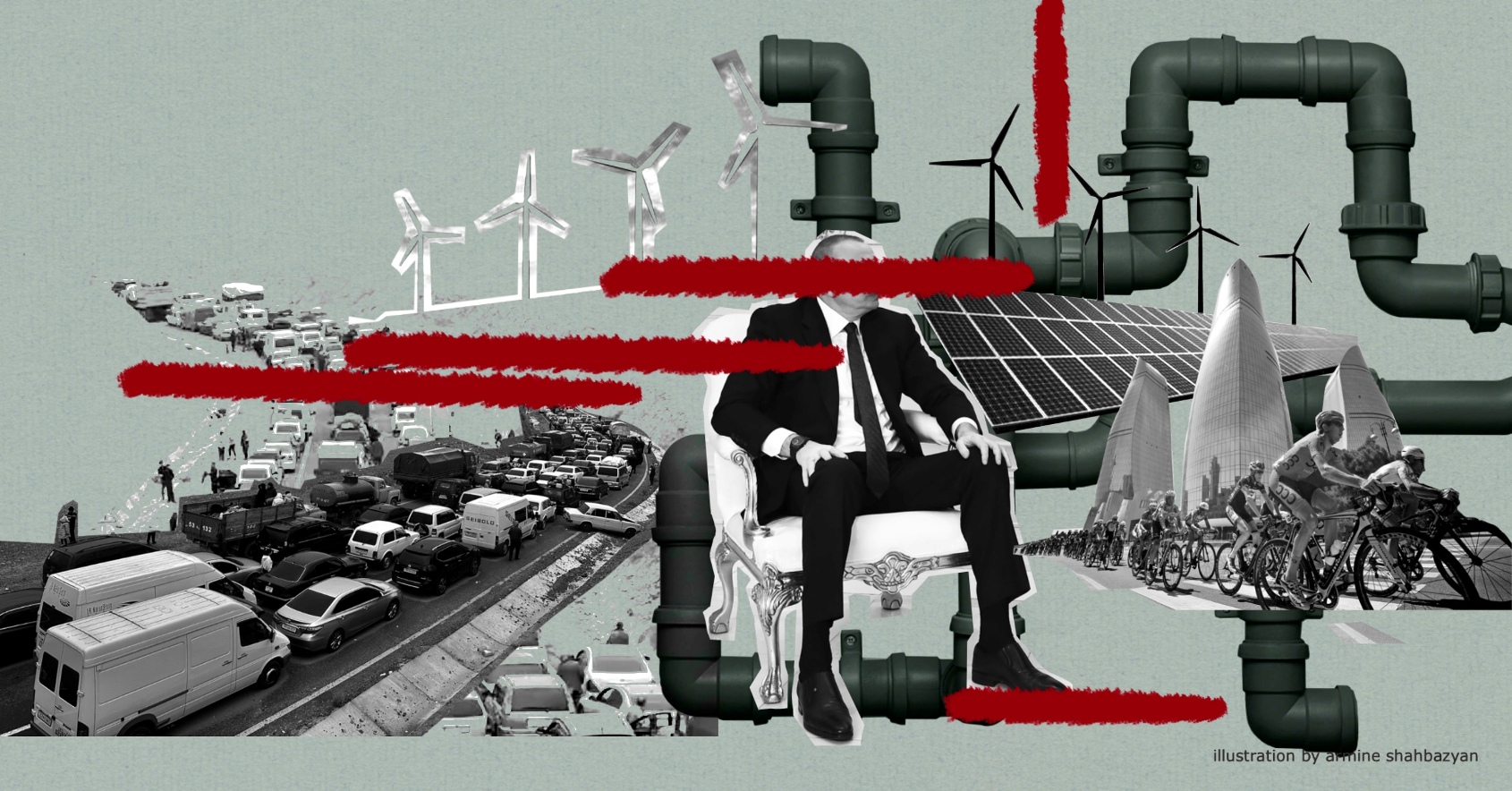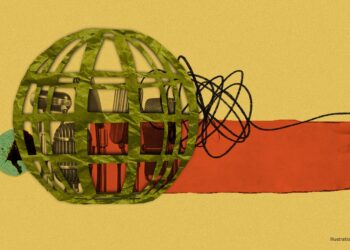
Listen to the article.
The Azerbaijani state has embarked on a concerted effort to enhance its international image following the Second Karabakh War in 2020 and especially since the subsequent ethnic cleansing of Armenians orchestrated by President Ilham Aliyev’s regime. Baku is spending hundreds of millions in funding and enormous resources to showcase itself as a modern, dynamic, and influential state, which is reflected in President Aliyev’s “Azerbaijan 2030: National Priorities for Socio-Economic Development”.
As Jordi Xucla writes in a recent article:
The Government of Azerbaijan promotes a political and communicative strategy aimed at presenting a new image of post-conflict Nagorno-Karabakh. The green economy, renewable energies, international solidarity in the cleaning of anti-personnel mines that have remained in the territory and the construction of smart villages are the letters of presentation of a territory that the Government wants to project internationally. The construction of infrastructure and the cleaning of anti-personnel mines are the basis for realizing “the great return” of the internally displaced people caused by the conflict. … Azerbaijan was chosen to organize COP29 in November 2024. The country follows the pattern of other States such as Norway, the United Arab Emirates or Saudi Arabia that combine their status as leading producers of fossil fuels with leadership in the production of renewable energy and the leadership in the fight against climate change.
Baku’s international image-making efforts, which heavily rely on the consistent demonization of Armenia and Armenians, include cultural diplomacy, economic branding, sports, and strategic public relations. These initiatives seek to shape perceptions and assert Azerbaijan’s role in the region and on the world stage. While Azerbaijan’s multi-vector and multi-dimensional policies have achieved notable results, their effectiveness is tempered by significant obstacles and ongoing challenges.
Cultural Diplomacy
Azerbaijan leverages its cultural heritage as a cornerstone of its soft power, branding itself as a bridge between civilizations at the crossroads of Europe and Asia. Central to this effort are cultural festivals and events that celebrate “Azerbaijani traditions.” Notable examples include the Baku Jazz Festival and the Mugham Music Festival, which spotlight the country’s musical heritage. Furthermore, traditional crafts like carpet weaving and mugham music have been recognized by UNESCO as part of the world’s intangible cultural heritage.
A key narrative underpinning Azerbaijan’s cultural diplomacy is its emphasis on “multiculturalism”. The country positions itself as a land of religious and cultural tolerance, highlighting the supposed harmonious coexistence of Islam, Christianity, and Judaism. This narrative aims to appeal to global audiences seeking examples of harmony in a world marked by division.
In a report on Azerbaijan, Forum 18, a Norwegian-Danish-Swedish NGO for freedom of thought, conscience and religion, underlined the continued exploitation of religion in state affairs:
“The regime [in Azerbaijan], foreign apologists, and religious leaders coerced or co-opted by the [authorities], use claims of what the regime calls ‘tolerance, ‘dialogue’, ‘multiculturalism’ and similar terms to deny the reality of the regime’s serious human rights violations. For instance, delegations of religious leaders are used for propaganda when the regime seeks international trade agreements.”
Following the “Karabakh victory,” the Azerbaijani government intensified its efforts to brand the country as a center of multiculturalism and religious tolerance. In a speech to the nation on November 25, 2020, President Aliyev proudly declared that “Azerbaijan’s policy on multiculturalism and inter-religious relations is praised by the whole world and world leaders.” Yet this prolonged and extensive campaign comes at a significant cost to the very ethnic and religious communities it claims to promote and protect. The State Committee for Work with Religious Organizations now controls all Muslim educational institutions, censors religious texts across all faiths, and determines whether to permit the construction or renovation of places of worship.
Sports Diplomacy
Azerbaijan has made significant investments in sports to boost its global visibility. The country has adopted hosting large-scale international sporting events as a central strategy. By hosting the European Games (2015), the annual Formula 1 Azerbaijan Grand Prix in Baku (2016), and world championships in wrestling and judo, Azerbaijan has established itself as capable of organizing high-profile competitions.
In addition to hosting events, Azerbaijani athletes have competed in wrestling, boxing, and judo––sports that have become symbols of national pride. The construction of state-of-the-art sports facilities, including the Baku Olympic Stadium, dubbed “an icon of sports architecture”, demonstrates Azerbaijan’s commitment to presenting itself as a modern and competitive nation.
Economic Branding
Azerbaijan’s economic branding centers on its role as a major energy exporter and its economic diversification efforts. The country plays a critical role in Europe’s energy security through key infrastructure like the Southern Gas Corridor and the Baku-Tbilisi-Ceyhan (BTC) pipeline, which deliver natural gas and oil to global markets.
Beyond the energy sector, Azerbaijan aims to establish itself as a trade, logistics and tourism hub. Its “strategic location” on the historic Silk Road is used to brand itself as a gateway for commerce between Europe and Asia. Through campaigns such as “Azerbaijan: Take Another Look”, highlight its natural beauty, historic sites, and modern architecture, drawing attention to its potential as a travel destination.
Diplomatic Engagement
Azerbaijan’s diplomatic efforts are aimed at bolstering the country’s influence in international organizations and fostering bilateral relationships. As a member of the Non-Aligned Movement, the Organization of Islamic Cooperation (OIC), and the GUAM Organization for Democracy and Economic Development (where Baku holds the 2024 chairmanship), Azerbaijan actively influences regional and global policies—consistently employing anti-Armenian rhetoric and lobbying against Armenia. In December 2023, Azerbaijan expanded its international presence by joining the Developing Eight (D-8) Organization as its ninth member during its meeting in Cairo.
Baku portrays itself as a “stabilizing force” in the South Caucasus, especially following the Second Nagorno-Karabakh War in 2020. While the conflict’s outcome strengthened national pride in Azerbaijan, international opinion remains divided on the country’s regional role.
Nation Branding Through Iconic Projects
Azerbaijan has transformed its capital into “a symbol of progress and modernity.” The city’s urban redevelopment features iconic landmarks such as the Heydar Aliyev Center designed by the Iraqi-British architect Zaha Hadid, and the Flame Towers, which have become synonymous with Azerbaijan’s ambitions.
These architectural mega-projects are used strategically to attract global tourists. While emphasizing its Islamic credentials whenever useful in diplomatic relations, Azerbaijan uses the slogan “Land of Fire” to emphasize its historical connection to Zoroastrianism and its natural wonders, including mud volcanoes and the burning mountain of Yanar Dag. A state-sponsored website describes the nation as “the miraculous country of Azerbaijan with its unlimited natural resources, centuries-old culture, history, and ancient people, whose lifestyle presents a unique and harmonious combination of the traditions and ceremonies of different cultures and civilizations.”
Public Relations and Media Campaign
Finally, Azerbaijan actively engages with international media, and its Azerbaijani and Turkish diaspora communities to promote favorable narratives. Through global media outlets, it showcases its cultural, economic, and political achievements, while mobilizing the Azerbaijani diaspora to advocate for national interests abroad. As Baku State University graduate Sergey Rumyantsev wrote: “For Azerbaijan’s ruling Aliyev regime, a diaspora is synonymous with an overseas political lobby.
In recent years, the international media has extensively covered human rights abuses, media restrictions, arrest of journalists, and rampant corruption, especially by high ranking officials. For instance, The Guardian published a scathing article on December 20, 2024, about members of the British House of Lords, which stated:
“Public shows of support by peers [Lords] for Azerbaijan appear to have increased this year before the country hosted the Cop29 summit in Baku. A number of peers have accepted paid-for trips to act as observers during elections, most recently for a ballot in the disputed Nagorno-Karabakh region, whose government was overthrown by Azerbaijan during a military offensive last year.” One of the Lord’s sons, “while working as a researcher in the Lords for his father, secured a three-month paid role with Socar’s trading arm in Geneva as a sustainability intern from January to March 2023.”
Challenges to Azerbaijan’s International Image
Despite extensive and costly efforts, Azerbaijan faces significant challenges in its image-making campaign, especially regarding human rights, the Nagorno-Karabakh conflict, and authoritarianism.
International organizations have raised concerns about Azerbaijan’s suppression of political dissent, media freedoms, and civil society activities. These issues tarnish its reputation, particularly among Western democracies.
The U.S. State Department, in a statement released on December 11, said: “We urge the Government of Azerbaijan to release those unjustly detained for their advocacy on behalf of human rights, cease its crackdown on civil society, respect the human rights and fundamental freedoms of all, and fulfill the commitments it made when it joined the Organization for Security and Cooperation in Europe.”
Azerbaijan’s military victory in the Second Nagorno-Karabakh War reinforced its sovereignty claims. However, territorial encroachment and ongoing tensions with Armenia—along with potential military aggression—continue to affect its international image.
The Aliyev regime’s tight control over politics and limited democratic processes have drawn criticism from international watchdogs, creating a gap between its branding efforts and global perceptions.
Finally, the Armenophobic elements in Azerbaijan’s image-making and branding include creating a “national” Christian Church—the so-called “Albanian Apostolic Church”––to deny and delegitimize centuries of Armenian presence in Artsakh and the region. The engineering of a Christian church by a predominantly Muslim state represents an unprecedented phenomenon in the 21st century. However, as President Aliyev stated, Azerbaijan does not feel the need to “defend” or justify its intentions “from a propaganda point of view.”
The Azerbaijani state’s demonization of Armenians employs tactics—such as denying facts, erasing historical and physical evidence, and rewriting history—as part of its broader “political attack” strategy. The primary goal of this strategy is to strengthen Azerbaijani national identity and support the state’s nation-building efforts. As I have written elsewhere, this is achieved through two main approaches: first, promoting the narrative that the Republic of Azerbaijan and its people have ancient roots in the Caucasus—backed by state-sponsored “scientific research” and the establishment of institutions focused on “culture,” “multiculturalism,” and “religious tolerance”; second, vilifying Armenians as the “enemy,” by labeling them as “fascists,” “hateful,” and “despicable” people who have allegedly stolen Azerbaijan’s “national heritage” for centuries.
Also see
International Arbitration and Armenia: Arbitrating Animosity
Azerbaijan has been weaponizing legal instruments and treaties against Armenia, transforming tools of mutual benefit into means of antagonism. Davit Khachatryan explains the mechanisms, types and implications of arbitration, shedding light on its strategic misuse and the broader consequences for Armenia.
Read moreAfter COP 29: What’s Fueling Aliyev’s Rage?
Escalating his anti-Armenian rhetoric at COP 29, Azerbaijani President Ilham Aliyev also broadened his attacks on Western institutions. Coupling state propaganda with inflammatory speeches, he framed the West as complicit in regional instability and intensifying tensions to deflect attention from his authoritarian regime.
Read moreThe ICJ’s Response to Azerbaijan’s Strategic Use of CERD Proceedings Against Armenia
Davit Khachatryan’s analysis of Azerbaijan's 2021 ICJ proceedings against Armenia under CERD, explores Baku’s strategic attempt to counter Armenia's evidence-based claims, create a false equivalency, and influence the judiciary through calculated legal maneuvering.
Read morePolicy of Intimidation: How Azerbaijan Tricked and Treated Ahead of COP29
Ahead of COP29, Azerbaijan has intensified its repression of dissent, arresting activists and silencing critics to project an image of peace. Rasmus Canbäck examines how Azerbaijan’s “Policy of Intimidation” serves as a tool to stifle internal opposition and manipulate international narratives.
Read moreBaku’s Manipulation of Anti-Colonial Narratives Against France in Sub-Saharan Africa
In response to France’s criticism of Azerbaijan’s coercive tactics against Armenia and the deepening France-Armenia partnership, Baku has escalated its information warfare against Paris. Sossi Tatikyan examines how Azerbaijan exploits anti-colonial narratives against France among Sub-Saharan African nations.
Read moreTo War or Not to War? Russia’s Coaxing and Aliyev’s Dilemma
If Azerbaijan’s Aliyev attacks Armenia, it risks Armenia's survival but would be self-sabotage for Baku. Such aggression would push Aliyev into Russia’s revisionist orbit, thereby undermining his external geopolitical patronage system—a key factor for his regime's survival. Anna Ohanyan explains.
Read more






